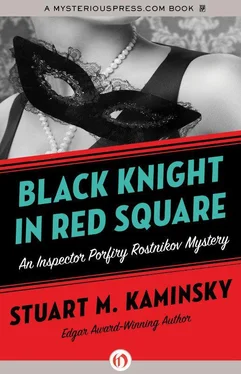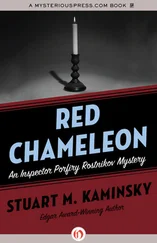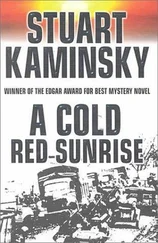Stuart Kaminsky - Black Knight in Red Square
Здесь есть возможность читать онлайн «Stuart Kaminsky - Black Knight in Red Square» весь текст электронной книги совершенно бесплатно (целиком полную версию без сокращений). В некоторых случаях можно слушать аудио, скачать через торрент в формате fb2 и присутствует краткое содержание. Год выпуска: 1983, ISBN: 1983, Издательство: Fawcett, Жанр: Полицейский детектив, на английском языке. Описание произведения, (предисловие) а так же отзывы посетителей доступны на портале библиотеки ЛибКат.
- Название:Black Knight in Red Square
- Автор:
- Издательство:Fawcett
- Жанр:
- Год:1983
- ISBN:9780804104050
- Рейтинг книги:5 / 5. Голосов: 1
-
Избранное:Добавить в избранное
- Отзывы:
-
Ваша оценка:
- 100
- 1
- 2
- 3
- 4
- 5
Black Knight in Red Square: краткое содержание, описание и аннотация
Предлагаем к чтению аннотацию, описание, краткое содержание или предисловие (зависит от того, что написал сам автор книги «Black Knight in Red Square»). Если вы не нашли необходимую информацию о книге — напишите в комментариях, мы постараемся отыскать её.
Black Knight in Red Square — читать онлайн бесплатно полную книгу (весь текст) целиком
Ниже представлен текст книги, разбитый по страницам. Система сохранения места последней прочитанной страницы, позволяет с удобством читать онлайн бесплатно книгу «Black Knight in Red Square», без необходимости каждый раз заново искать на чём Вы остановились. Поставьте закладку, и сможете в любой момент перейти на страницу, на которой закончили чтение.
Интервал:
Закладка:
He was waiting for reports on the two dead Russians. Neither one seemed likely to have been the intended victim. But, just in case, Rostnikov had called the home towns of both men and asked for a local inquiry and investigation.
No, he thought, transferring a weight to his right hand, the American journalist was the most likely target. Karpo’s report had led him to that conclusion. Karpo’s prostitute had said that Aubrey, the American, spoke of a frog bitch. Rostnikov remembered that Americans and Englishmen used the word “frog” in a pejorative sense to mean French. He had read that in one of his American detective novels. So the drunk and dying American in the back seat of a Moscow taxi had referred to a Frenchwoman. According to Aubrey’s notebook, he had interviewed a Frenchwoman the day before his death. After the encounter outside the elevator, Rostnikov had dispatched Tkach to interview this Frenchwoman, Monique Freneau.
Yes, Rostnikov thought, he had done the right thing. Now the investigation could wait till morning when he would talk to Tkach, interview the German, and have Tkach interview the Englishman.
Rimsky-Korsakov and Rostnikov finished at almost the same time. Rostnikov reached over, panting, turned off the radio, put his weights away, and went to the kitchen table.
The food was excellent. They drank the borscht slowly, dug into the chicken with gusto, drank the wine with approval. Then it came.
“Porfiry,” Sarah said, playing with a piece of chicken on her plate. “What do you think about France?”
The question was startling since he had, in fact, just been thinking about France. Her blue eyes suddenly met his.
“I am not overly fond of the French,” he said, pouring the last of the wine from the small bottle. “In their assumed superiority they have little tolerance for any other people. They find Russians particularly barbaric. I think it has something to do with Napoleon’s inability to-”
“No,” Sarah interrupted. “I mean what would you think about living in France. Or England, or Israel, or even America or Canada.”
That was it, then, Rostnikov thought. The idea had remained unspoken for so long, but now it was out. Sarah was a Jew. She could apply for immigration. It would not be easy, but it could be done, and Porfiry, as her husband, could apply with her. The problem, as they both knew, was that as soon as they applied, they would become objects of abuse. Their lives would be made miserable. They might well lose their jobs and be given tasks of no responsibility or merit. Their son Iosef would suffer, and, worst of all, they probably would never be given permission to leave. But it was something Rostnikov had been considering seriously since his job had grown more political and since his knowledge had become a potential danger to the state.
“Sarah,” Rostnikov sighed, “I’m a policeman. They would never let me go.”
“You know people,” she said. “People who could help us.”
Whom did he know? Anna Timofeyeva? What influence did she have? And as a loyal Party member, what would she think of his wanting to leave, to desert the cause when she was giving her life to it?
“I don’t know anyone who would be willing to help us,” he said.
Their eyes met, and he could see something in hers that she had been careful to conceal before, if it had been there.
“Porfiry,” she said. “We are more than fifty years old. It is worth trying.”
Insanely, the name Isola came to mind. Isola, the city of Ed McBain, where the police behaved so differently from those in Moscow. Now, if he could go to Isola…
“Sarah,” he said, “it cannot be.”
She nodded, got up, and began to clear away the dishes. An observer might conclude from this that the matter was ended, but Rostnikov knew better. He knew that it had only begun and that Sarah was much more patient and even more intelligent than he was. Besides, Rostnikov had been more than toying with the idea for some time.
The knock at the door was gentle. They thought the sound was coming from across the hall. Then it was louder. Rostnikov grabbed the table and pushed himself up, feeling the tug of the conversation and the nip of the wine.
At first when he opened the door, he didn’t recognize the man before him.
“Yes?” said Rostnikov, wiping his moist brow with the hem of his shirt.
“I’m from upstairs,” said the thin Bulgarian.
“The toilet,” Rostnikov suddenly remembered. He had dismantled the toilet early in the morning, and the Bulgarians had been waiting for his return.
“Ah,” sighed Rostnikov, “I have consulted an expert, the chief plumber at the Metropole Hotel. I’ll have it fixed in a few minutes. Never fear.”
He pushed the Bulgarian gently into the hall.
“I’ll just get my tools and be right there,” he said softly, not wanting a neighbor to overhear and call the dreaded Samsanov.
Sarah looked up at him when he closed the door. In her eyes was the unspoken question, Would this happen in Paris or Montreal or Chicago?
Rostnikov shrugged, believing that it would, but thinking it unwise to raise the issue again.
“I’ll be right back,” he said. “This will take me no more than fifteen minutes.”
It was, in fact, nearly two hours before Rostnikov returned. There had been unforeseen complications. The tools had been inadequate, and the book he had been using was far out of date. He had eventually managed to get the pipe repaired, but he feared that the repair was temporary.
“Toilet is now fixed,” he told Sarah, who was sitting at the table writing a letter, probably to her sister or Iosef.
“That’s good,” she said, looking over the top of her glasses and smiling, her mind in Odessa or Kiev or San Diego.
Rostnikov was washing at the sink when the phone rang. Sarah answered it and held it out to him.
“I don’t know who it is,” she said with a shrug.
He crossed the room and took the phone. “Rostnikov,” he said.
“In the morning,” came the man’s voice, “at precisely seven, you are to be at the office of Colonel Drozhkin.”
Rostnikov said nothing.
“Do you understand?” came the voice.
Rostnikov recognized the man as Zhenya, Colonel Drozhkin’s assistant.
“I understand,” Rostnikov said evenly. “I will be there at seven.”
They hung up, and Rostnikov turned to his wife. “Business,” he said. “I have an appointment early in the morning.”
That was all he said. He reread a mystery by Lawrence Block and went to bed wondering what the KGB wanted from him this time.
In the evening right after the incident with the gang of rapists, Sasha Tkach took a bus to the Rossyia Hotel. He went through the huge glass doors and across the vast lobby whose walls were covered with film posters and blowups of movie stars, mostly Bulgarians, and advanced to the desk. He gave the name of the woman he was seeking, Monique Freneau, identified himself, and waited while the clerk at the long desk looked up the name. He couldn’t find it. Normally, the clerk would have given up, but this was a policeman with a determined look in his eyes, so the clerk tried the rosters for the other towers and eventually found the Frenchwoman’s name.
The Hotel Rossyia is a sharp contrast to the Metropole. It is massive and new and official comments in tourist books and publicity call it “the Palace.” Muscovites, looking up at the gigantic structure on the Moskva River, refer to it as “the box.” The twelve-story hotel has thirty-two hundred rooms, nine restaurants, two of which can seat a thousand diners each, six bars, fifteen snack bars, and the world’s largest ballroom. It also houses two movie theaters for eight hundred spectators and one larger cinema hall, the Zaryadye, which can comfortably accommodate three thousand people.
Читать дальшеИнтервал:
Закладка:
Похожие книги на «Black Knight in Red Square»
Представляем Вашему вниманию похожие книги на «Black Knight in Red Square» списком для выбора. Мы отобрали схожую по названию и смыслу литературу в надежде предоставить читателям больше вариантов отыскать новые, интересные, ещё непрочитанные произведения.
Обсуждение, отзывы о книге «Black Knight in Red Square» и просто собственные мнения читателей. Оставьте ваши комментарии, напишите, что Вы думаете о произведении, его смысле или главных героях. Укажите что конкретно понравилось, а что нет, и почему Вы так считаете.












